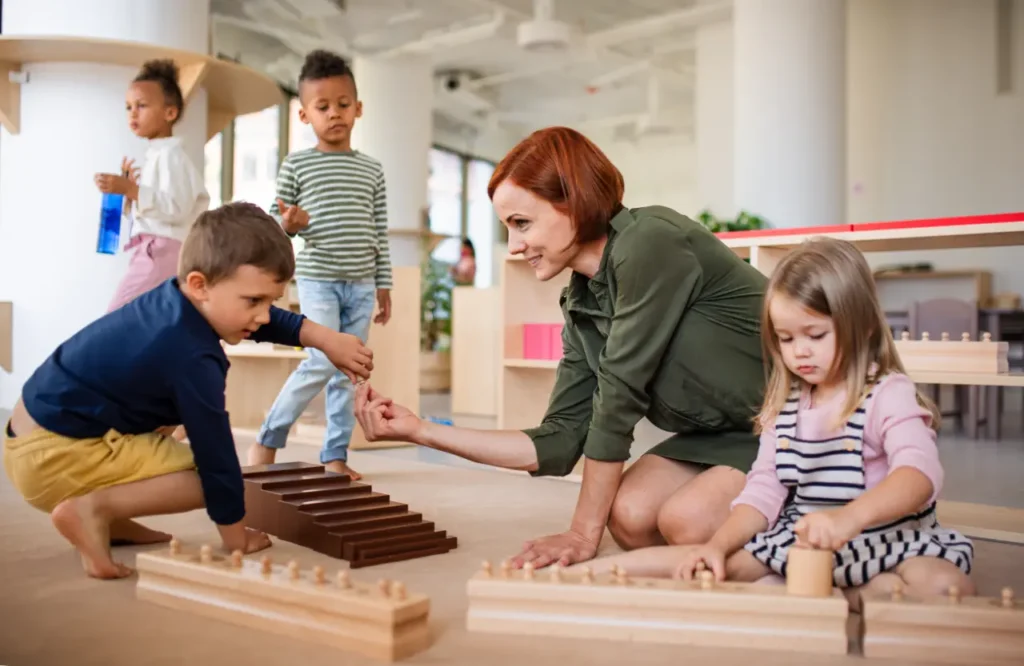Choosing the right educational path for your child can be a daunting task. With so many options available, it’s important to understand the benefits each one offers.
One such option is Montessori education. This unique approach to early childhood education has been around for over a century. It was developed by Dr. Maria Montessori, an Italian physician and educator.
Montessori education is child-centered. It fosters independence and self-directed learning. Children in Montessori settings learn through hands-on activities, using materials designed to be self-correcting.
The Montessori curriculum covers practical life skills, sensory-based learning, language, math, and cultural studies. It aligns with many developmental milestones in early childhood. This makes it a great choice for preschoolers.
In this article, we will delve into the benefits of Montessori education for preschoolers. We will explore how this educational philosophy can positively impact a child’s early development and learning experience.
Whether you’re a parent, an educator, or simply interested in alternative educational philosophies, this guide will provide you with comprehensive insights. So, let’s dive in and discover the world of Montessori education.
Understanding Montessori Education
Montessori education is a unique approach to learning. It’s based on the belief that children are naturally curious and eager to learn. This educational philosophy respects the child’s natural psychological development.
The Montessori method is not just about academics. It’s about nurturing the whole child. This includes their physical, social, emotional, and cognitive growth.
Montessori education is also about creating a prepared environment. This is a space where children can learn at their own pace. It’s designed to foster independence and a love for learning.
The Montessori Method: A Brief Overview
The Montessori method is child-centered. It allows children to learn through hands-on experiences. This approach encourages children to explore and discover on their own.
Montessori classrooms are mixed-age. This encourages peer learning and collaboration. It also allows children to learn from each other.
The Montessori curriculum is broad and comprehensive. It covers practical life skills, sensory-based learning, language, math, and cultural studies. This holistic approach to education fosters a love of learning and curiosity.
The Role of the Teacher in Montessori Education
In Montessori education, the teacher plays a unique role. They act as guides rather than traditional instructors. They observe and support the child’s learning rather than direct it.
The teacher’s role is to prepare and maintain the learning environment. They introduce materials and activities based on the child’s individual needs and interests.
Montessori teachers respect and value the child’s choices and independence. They foster a supportive and non-competitive learning environment. This helps children develop a positive attitude towards learning.
Key Benefits of Montessori Education
Montessori education offers numerous benefits for preschoolers. It fosters independence, encourages developmental milestones, and promotes hands-on learning.
The prepared environment, social development in mixed-age classrooms, and a holistic curriculum are also key benefits. These elements create a unique and effective learning experience for children.
Fostering Independence Through Independent Play
Montessori education encourages independent play. This is a crucial aspect of a child’s development. It allows children to make choices and learn from their experiences.
Independent play in Montessori settings is purposeful and engaging. It’s designed to stimulate curiosity and foster a love for learning.
Through independent play, children learn to take responsibility. They learn to care for their environment and personal belongings. This fosters a sense of independence and self-confidence.
In Montessori classrooms, children are free to choose their activities. This freedom of choice encourages self-directed learning and autonomy.
Encouraging Developmental Milestones
Montessori education aligns with many developmental milestones in early childhood. It supports the development of fine and gross motor skills, language, and cognitive abilities.
Montessori materials are designed to be progressively challenging. They meet the child’s changing needs and abilities. This helps children reach their developmental milestones at their own pace.
The Montessori approach is adaptable. It can be personalized for each child. This ensures that each child’s unique developmental needs are met.
Hands-On Learning: Engaging with the Environment
Hands-on learning is a key component of Montessori education. Children learn through direct interaction with their environment. This promotes active learning and engagement.
Montessori materials are designed to be self-correcting. This allows children to learn from their mistakes. It also promotes autonomy and problem-solving skills.
Hands-on activities in Montessori classrooms are meaningful and purposeful. They reflect real-life tasks and challenges. This makes learning relevant and interesting for children.
Through hands-on learning, children develop a deeper understanding of concepts. They learn to apply their knowledge in practical ways.
The Prepared Environment: A Unique Learning Space
The prepared environment is a key component of Montessori education. It’s a space that is carefully designed to meet the child’s needs. It’s orderly, aesthetically pleasing, and child-sized.
The prepared environment encourages exploration and discovery. It’s equipped with a variety of materials that stimulate the child’s senses. This promotes sensory perception and discrimination.
In the prepared environment, children have freedom within limits. They can choose their activities and work at their own pace. This fosters independence and self-discipline.
The prepared environment is also a peaceful and harmonious space. It’s designed to mimic a nurturing home environment. This creates a sense of security and belonging for children.
Social Development in Mixed-Age Classrooms
Social development is a key aspect of Montessori education. Mixed-age classrooms encourage peer learning and collaboration. They allow children to learn from each other.
In mixed-age classrooms, older children often help younger ones. This fosters a sense of community and cooperation. It also helps children develop leadership and organizational skills.
Mixed-age classrooms also allow children to learn at their own pace. They can work on activities that match their abilities and interests. This promotes individualized learning and respect for diversity.
Social interactions in Montessori classrooms are respectful and considerate. Children learn to resolve conflicts in a peaceful manner. This fosters emotional intelligence and conflict resolution skills.
The Montessori Curriculum: A Holistic Approach
The Montessori curriculum is comprehensive and holistic. It covers practical life skills, sensory-based learning, language, math, and cultural studies. This broad curriculum fosters a love of learning and curiosity.
The Montessori curriculum values the process of learning over the end result. Children are encouraged to explore, experiment, and make mistakes. This fosters a growth mindset and resilience.
Montessori education also promotes cultural awareness and diversity. The curriculum often includes multi-cultural and multi-lingual elements. This helps children develop a global perspective and understanding.
The Montessori curriculum is designed to engage the whole child. It nurtures their physical, social, emotional, and cognitive growth. This holistic approach to education fosters a balanced and holistic view of the world.
Montessori Education and Early Childhood Development
Montessori education plays a significant role in early childhood development. It aligns with the natural growth patterns and sensitive periods of children. This makes it a highly effective approach for preschool learning.
The Montessori method supports various learning styles. It offers a range of activities that cater to different interests and abilities. This ensures that every child’s learning needs are met.
Aligning with Early Childhood Educational Philosophy
Montessori education aligns with the principles of early childhood educational philosophy. It respects the child’s natural psychological development. It also values the child’s innate curiosity and desire to learn.
The Montessori approach views the child as an active participant in their learning. Children are encouraged to explore, ask questions, and seek knowledge. This fosters a positive attitude towards school and learning.
Montessori education also values the partnership between parents, teachers, and the community. It recognizes the importance of a supportive and engaging learning environment. This fosters a sense of community and belonging in children.
In Montessori classrooms, learning is seen as a joyful and engaging process. This aligns with the belief that education should be child-centered and developmentally appropriate.
Montessori Preschool Activities and Their Role in Growth
Montessori preschool activities play a crucial role in a child’s growth and development. They are designed to be hands-on, engaging, and meaningful. This makes learning a fun and exciting process for children.
Montessori activities are designed to be progressively challenging. They meet the child’s changing needs and abilities. This helps children reach their developmental milestones at their own pace.
Through Montessori activities, children learn practical life skills. They learn to care for themselves, others, and their environment. This fosters a sense of responsibility and accountability.
Montessori activities also support the development of critical thinking and problem-solving skills. Children are encouraged to think creatively and independently. This fosters innovation and intellectual growth.
How Montessori Methods Support Various Learning Styles
Montessori methods support various learning styles. They cater to visual, auditory, kinesthetic, and tactile learners. This ensures that every child’s learning needs are met.
In Montessori classrooms, children are free to choose their activities. This allows them to engage with materials that match their interests and learning style. This fosters motivation and engagement in learning.
Montessori materials are designed to be multi-sensory. They engage the child’s senses and promote active learning. This caters to children who learn best through hands-on experiences.
The Montessori approach also supports individualized learning paths. Children can work at their own pace and level. This respects the child’s unique learning style and pace of development.
Choosing a Montessori Preschool
Choosing a Montessori preschool for your child is a significant decision. It can shape their early learning experiences and influence their attitude towards education.
Montessori education can be found in various settings, including public, private, and charter schools. It’s important to research and visit potential schools to find the best fit for your child.
Finding a Montessori Pre School Near Me
Finding a Montessori preschool near you can be a daunting task. However, there are resources available to help you in your search.
Online directories and local parent groups can provide recommendations. You can also use search terms like “Montessori pre school near me” to find options in your area.
Remember, proximity is just one factor to consider. The quality of the program, the qualifications of the staff, and the school’s adherence to Montessori principles are equally important.
What to Look for in a Montessori Pre-School
When looking for a Montessori pre-school, there are several key factors to consider. First, observe the learning environment. It should be calm, orderly, and equipped with Montessori materials.
Next, consider the teacher’s role. They should act as guides, facilitating independent play and hands-on learning. They should also respect each child’s individual learning path.
Finally, look at the school’s curriculum. It should cover practical life skills, sensory-based learning, language, math, and cultural studies. It should also foster social development and encourage a love of learning.
Conclusion: The Lifelong Impact of Montessori Education
The benefits of Montessori education extend far beyond the preschool years. This unique approach to learning can lay a strong foundation for future academic success. It can also foster a lifelong love of learning and curiosity.
Montessori education can help children develop critical skills such as problem-solving, leadership, and emotional intelligence. It can also instill values like respect, responsibility, and a sense of community. These are all essential for personal growth and success in the wider world.
In conclusion, Montessori education offers a holistic, child-centered approach that can benefit preschoolers in numerous ways. Whether you’re a parent, educator, or caregiver, understanding these benefits can help you make informed decisions about early childhood education.


